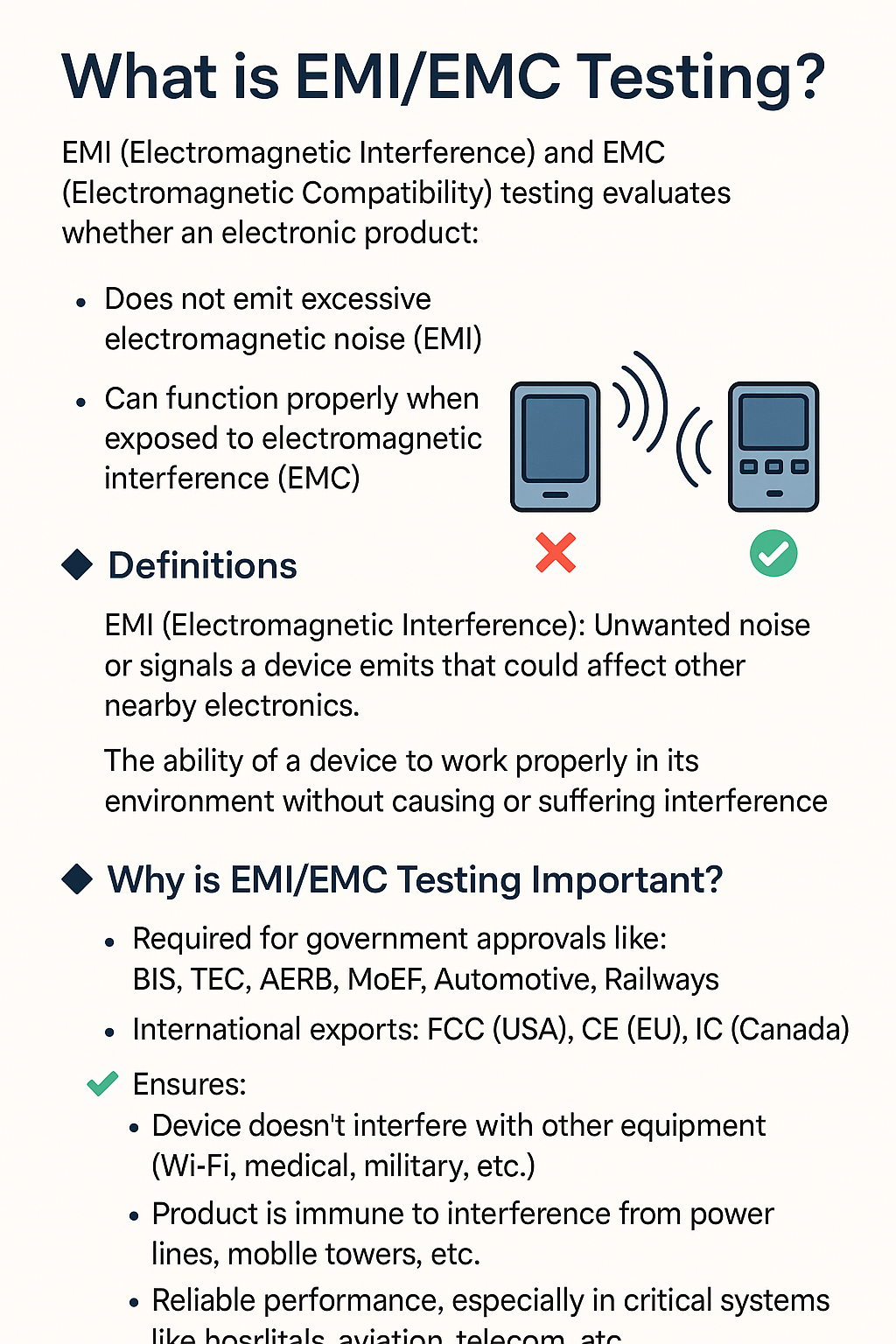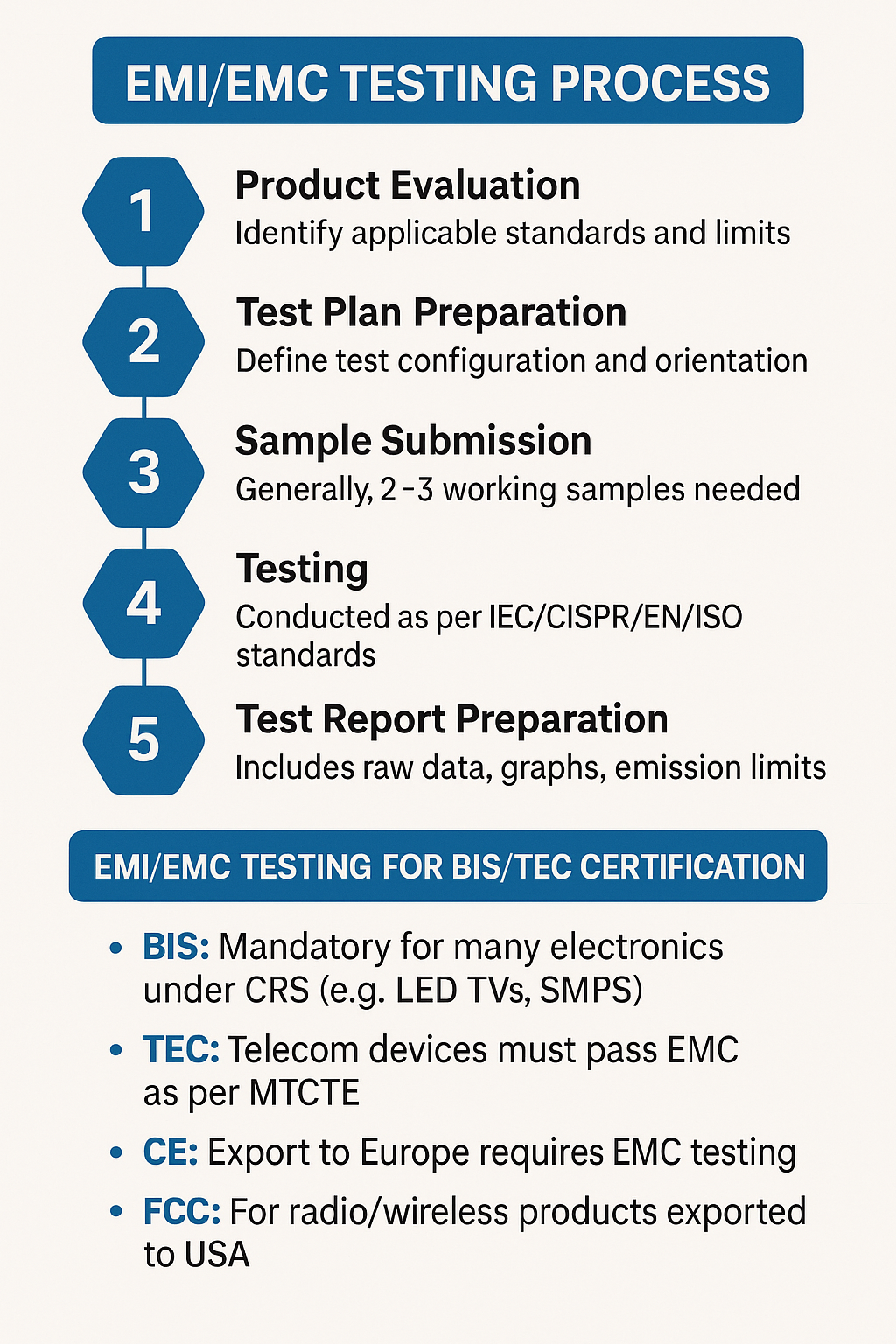EMI/EMC Testing — Everything You Need to Know
What is EMI/EMC Testing?
EMI (Electromagnetic Interference) and EMC (Electromagnetic Compatibility) testing ensure that your electrical and electronic products:
-
Do not emit excessive electromagnetic noise that could interfere with other devices.
-
Operate properly when exposed to a reasonable level of electromagnetic disturbances in their environment.
EMI/EMC compliance is crucial for any device with electrical/electronic circuits, including IT equipment, household appliances, telecom products, automotive electronics, medical devices, and more.

Why is EMI/EMC Testing Important?
- It is mandatory under various national and international standards such as CISPR, IEC, FCC, EN, and Indian standards under BIS CRS & TEC.
- Prevents operational failures or safety hazards due to electromagnetic interference.
- Smooth customs clearance for imports & exports.
- Builds customer trust by ensuring your product won’t cause or face unexpected malfunctions.
Scope of EMI/EMC Testing
A standard EMI/EMC test may include:
✔ Radiated Emission
✔ Conducted Emission
✔ Electrostatic Discharge (ESD) Immunity
✔ Radiated Immunity
✔ Conducted Immunity
✔ Surge & EFT Testing
✔ Harmonics & Flicker Measurements
The exact tests vary based on your product’s type, usage environment, and applicable standard.

FAQs on EMI/EMC Testing
Q1. What is the difference between EMI and EMC?
A: EMI is about the unwanted electromagnetic energy emitted by a device; EMC is the device’s ability to function properly in its electromagnetic environment without causing or being affected by interference.
Q2. Which products need EMI/EMC testing?
A: Almost every electrical/electronic product: computers, smartphones, routers, home appliances, automotive electronics, industrial equipment, medical devices, etc.
Q3. Is EMI/EMC testing mandatory in India?
A: Yes, for many products covered under BIS CRS, TEC, and other sectoral requirements. Global exports may require compliance with FCC, CE, or other regional standards too.
Q4. How long does EMI/EMC testing take?
A: It depends on your product and the number of test parameters but usually takes 5–10 working days in an accredited lab.
Q5. Can imported products use overseas test reports?
A: Some certifications accept international reports from accredited labs, but BIS CRS and TEC often require testing in a recognized Indian lab.
Q6. What documents do I need for EMI/EMC testing?
A: Product datasheet, circuit diagrams, block diagrams, user manual, label artwork, and samples.
Q7. Does EMI/EMC affect my BIS/TEC approval?
A: Yes — non-compliance can lead to test failure, delays in certification, or even rejection of the application.
Q8. How can Bharati Global Compliances help with EMI/EMC?
A: We coordinate the right lab, prepare your documentation, handle all submissions, and follow up until your product is compliant and your certificates are issued.
How Bharati Global Compliances Can Help You
We assess which EMI/EMC standards apply to your product.
Connect you with NABL/IEC-accredited labs for testing.
Coordinate all test schedules, monitor progress, and handle all paperwork.
Provide complete support for BIS, WPC, TEC, or global certifications.